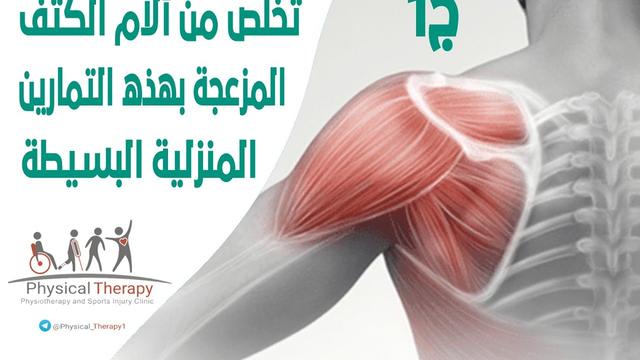How to get rid of shoulder pain?
Many people suffer from shoulder joint pain, for various reasons. At first, the injured person thinks that it is just a muscle strain, but the matter can develop into a treatment by means of strengthening and corrective exercises for the surrounding muscles that affect the movement of the shoulder.
Physicians diagnose some of these shoulder pains as either “impingement syndrome,” “frozen shoulder,” or “shoulder calcifications.”
In impingement syndrome, the gap between the head of the humerus and the bone above the shoulder blade is narrow. In many of these cases, the immune system's reaction causes a painful inflammation that requires drug treatment.
Treatment of impingement syndrome
In this case, Dr. Rudiger Arens, chief physician at the Center for Shoulder Surgery and Sports Injury Surgery at the Roland Hospital in Bremen, Germany, says, "It is important first to limit movements and actions that cause pain."

And he adds, "Secondly, it is necessary to treat the pain with appropriate medications." Otherwise, the specialists advise that the treatment plan include performing special exercises to return the joint to its normal position.
Treatment of frozen shoulder
When infected with frozen shoulder (adhesive capsulitis), the shoulder is very red, which indicates acute inflammation and causes severe pain.
In this case, doctors recommend a drug treatment, and after months the body's self-healing powers work to soften the joint, and through gentle kinetic therapy, shoulder movement can be restored and the pain begins to recede.
Treatment of calcifications in the shoulder
Calcifications in the muscle tendon can cause shoulder pain, with acute inflammation of the synovial bursa. Calcifications are treated with analgesics, and if the condition becomes severe, the patient is injected with cortisone three times as a maximum.
The alternative is to resort to shock wave therapy that stimulates tissues to form new blood vessels, which helps to reduce inflammation and better dismantle calcifications.
Finally, when you have shoulder pain, it does not necessarily mean that the shoulder is the cause, because the shoulder, neck and neck system are very complex and the causes of pain can be very different.
Dr. Sebastian Hermann, a doctor at Helios Emil von Behring Hospital in Berlin, says, "It is important to go to the doctor after an accident, for example, or a tear in the shoulder, or making a movement after which it is not possible to move the arm, or detecting a deformity." What, that is, when the shoulder becomes in a different shape than it was before, or when numbness is felt in the shoulder area.










